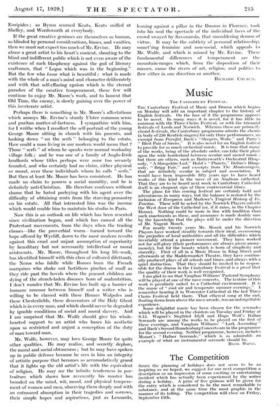Music
THE CANTERBURY FESTIVAL.
THE Canterbury Festival of Music and Drama which begins on Monday will add an important chapter to the history of English festivals. On the face of it the programme appears to be novel. In many ways it is novel, for it has little in common with the Three Choirs Festival, or with the triennial festivals of Leeds and Norwich. Whereas these are primarily choral festivals, the Canterbury programme admits the chorus (a body of 250 Kentish singers) for only three performances. an excerpt from Parsifal, Bach's "Sleepers, Wake" and Parry's " Blest Pair of Sirens." It is also novel for an English festival to provide for so much orchestral music. It is true that many of the works, being of the absolute order, can take their place upon the wide borderland between secular and sacred music ; but there are others, such as Butterworth's Orchestral Rhap- sody, "A Shropshire Lad," Holst's " Planets," 1)elius's Rhap- sody, " Brigg Fair," and excerpts from The Mastersinger.v, that are definitely secular in subject and association. It would have been impossible fifty years ago to have heard works of this kind in the nave of an Anglican cathedral. That they are to be heard next week in Canterbury Cathedral itself is an eloquent sign of these controversial times. The plans for this coming festival are certainly bold and adventurous in many ways, but the balance is restored by the inclusion of Everyman and Marlowe's Tragical History of Dr. Faustus. These will be acted by the Norwich Players outside the West door of the Cathedral (or, if it rains, in the Chapter House). Nothing could be more in line with tradition than such enactments as these, and assurance is made doubly sure by the knowledge that the plays will be under the direction of Mr. Nugent Monek.
For nearly twenty years Mr. Monck and his Norwich Players have worked steadily towards their ideal, overcoming the prejudice of local authorities and all the difficulties which invariably attend a pioneer movement. They have worked not for self-glory (their performances are always given anony- mously), but for the beauty which is born of simplicity and sincerity. First of all in a Music House in King Street and afterwards at the Maddermarket Theatre, they have continu- ally produced plays of all schools and times, and always with a quiet distinction. That they should be invited to be respon- sible for the drama in the Canterbury Festival is a proof that the quality of their work is well recognized. I am glad to see that Vaughan Williams' Pastoral Symphony will be played at one of the nave concerts. The texture of this work is peculiarly suited to a Cathedral environment. It is the music of " cool air and temperate summer evenings." I remember hearing it in Worcester Cathedral at the last Three Choirs Festival held there. That ethereal song at the end, floating down from above the nave arcade, was an unforgettable experience. Some delightful music has been chosen for the serenades which will be played in the cloisters on Tuesday and Friday at 9.15. Wagner's Siegfried Idyll and Hugo Wolf's Italian Serenade are among the works to be played on the first of these evenings, and Vaughan Williams"' Lark Ascending " and Bach's Second Brandenburg Concerto are in the programme for the second evening. Neither programme, however, includes Mozart's " Hafner Serenade," which is so admirable an example of what an instrumental serenade should he.
BASIL MAINE.
































 Previous page
Previous page